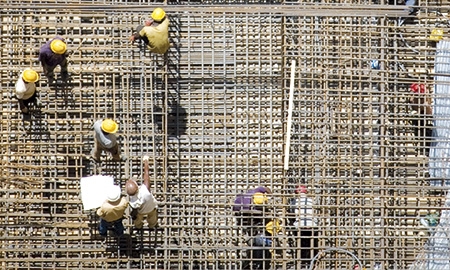Angola currently boasts one of the fastest growing economies on the continent of Africa and as it makes an effort to diversify away from oil production, no industry seems to be growing faster than construction, which has exploded by 21% in recent years, compared to a 10% growth rate across the rest of the economy.
Construction companies in Angola provide essential infrastructure necessary for connecting the country, as well as for providing basic services, such as education and health care. Much of this infrastructure was severely damaged in the course of Angola’s thirty year civil war, which ended in 2003.
One major player in Angola’s rapidly expanding construction industry is Acail, a Portuguese company which has been heavily invested in Angola since 2005.
Acail has a diverse business portfolio—doing everything from building bridges to adding the bubbles to Coca-Cola. In a statement, Acail says its goal is to solve the problems of the country. This can encompass a fairly broad list of demands.
Acail’s portfolio of clients include, but are not restricted to, Chevron, Total, BP, Halliburton, and Coca-Cola. But perhaps their most important client is the Angolan government itself, which has increasingly made efforts to partner with private companies in order to stimulate economic growth and diversification, to build stronger infrastructure, and to tackle the nation’s housing shortage.
Acail employs 140 people, 81% of whom are Angolan nationals. There is a strong emphasis on making sure that knowledge and information is shared between expats and the local population.
-------------------------------
Construction companies in Angola provide essential infrastructure necessary for connecting the country, as well as for providing basic services, such as education and health care.
|
About working with the Angolan government, Acail’s Vice President, Ana Paula Andrade says the Government is now “more responsive and proactive to the needs of the private sector.” This is apparent when you consider some of the programs the government has implemented over the course of the last decade, particularly with respect to housing.
In 2009 Angola faced a housing deficit of about two million. In response, the government launched a program called Meu Sonho, Minha Casa, which translates to My Dream, My Home. The goal was to provide one million additional homes in Angola by 2012 through engineering and architectural assistance. The program’s Managing Director, Eugenio Correia said, “housing is not a privilege or a choice; it is and should be a right for the people of Angola.” The private sector has consistently played a crucial role in helping to meet the demand for housing in Angola.
Jose Silva, Angola’s Minister of Urban Development and Housing explained that when it comes to solving the housing shortage, Angola’s success generally depends largely on public-private partnerships; that’s to say the government working in tandem with private companies—often times foreign investors.
Acail has been involved in many construction projects beyond housing. One such project involved building the necessary infrastructure to power the country. Acail built concrete posts for high and medium voltage electricity cables—a crucial step for ensuring that Angola has the tools to compete in a global economy.
Acail was also involved in re-building the Catumbela bridge that joins Benguela to Lobito, the second largest port in Angola.
Acil also had a hand in building Prenda Hospital—a major government investment in public health. But despite the success of construction companies in Angola, considerable challenges remain.
“Our greatest difficulty,” Silva said, “is managing logistics, because we still have a strong dependence on imported building material.” This impacts the cost of construction in Angola, and Silva said it “constitutes a major constraint for the normal development of our programs in that sector.” Another challenge Silva pointed out “is for the participation of the financial sector, mainly with regard to mortgage loans,” since the need for homes can only be satisfied with sufficient financing by banks.
One thing that is not scarce in Angola is human capital. The Angolan government wants to ensure that maximum knowledge and skills are transferred from contractors to the local labor force.
A successful bid on a government contract in Angola may well depend on a company’s ability to demonstrate how they will employ and fully equip the Angolan workforce. This is a key if a company wants to win government contracts in Angola, and Acail has more than proven their investment in this area.
Acail employs 140 people, 81% of whom are Angolan nationals. There is a strong emphasis on making sure that knowledge and information is shared between expats and the local population.
Andrade said the country is “growing exponentially and the structures we have put in place guarantee that we will be a leading player in the foreseeable future.”

0 COMMENTS